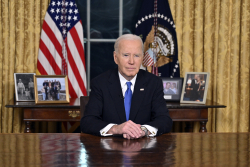Despite fiery rhetoric, Russia has offered Iran no real support after US strikes, revealing Moscow’s weakened position, competing interests, and reluctance to jeopardize ties with Israel, the Gulf, or Trump.
Within hours of the US strike on Iranian nuclear facilities, former Russian President and current Deputy Head of the Russian Security Council blasted the US action and threatened to help Iran. He said, “Not only would the strike strengthen the Islamist regime, but a number of countries are ready to supply nuclear warheads to Iran.”
The reality, however, is quite different: The Kremlin is unwilling to take action beyond words in Iran’s defense. It would seem that Moscow’s position in the Middle East is severely weakened by the collapse of the Assad regime in Syria and by its central focus on the war in Ukraine.
Russia and Iran Have a Close Relationship
The Kremlin has always aspired to a leading role in the Middle East. During Soviet times, it hoped for neither war nor peace. The instability facilitated its prominent position as an arms supplier and possible mediator. From a weakened position after the Soviet collapse, it regained some relevance and stature when it intervened in Syria in 2015 to save then-President Bashar al-Assad from the Arab Spring. More recently, it has enjoyed some success by establishing good working relationships with the Gulf states and by trying to mediate, along with Iran and Turkey, a solution to the then 9-year civil war in Syria.
All that changed with the fall of the Assad regime in December 2024.
Before the onset of the Israeli attacks on Iran on June 13, 2025, all that Russia had left was its relationship with Tehran. Russia has invested in multiple projects in Iran, including those related to oil and natural gas infrastructure. And Iran, as a Russian client, not only provided Moscow with a toehold in the region, but also, perhaps most importantly, began supplying missiles and drones to be used in Russia’s war against Ukraine.
Iran has also transferred drone technology to Russia, which has allowed Russia to develop its versions of the Shahid 163s. In January 2025, Moscow and Tehran signed a strategic partnership agreement, which included military cooperation but most notably did not include a mutual defense clause.
Why Is Russia Not Helping Iran Against Israel?
Nonetheless, neither the Russians nor the Iranians fully trusted each other. Despite repeated requests from the regime in Tehran, Russia has thus far refused to transfer SU-35 aircraft and S-400 air defense systems. Furthermore, as some analysts have noted, Iran was never willing to supply troops to the Ukraine war effort the way North Korea did.
In the aftermath of the initial Israeli attack on Iran, the Russian Foreign Ministry expressed “deep concern” about rising Middle East tensions and accused Israel of violating international law. Moscow tried to position itself as a mediator between Iran and Israel, where approximately 20 percent of the population is Russian-speaking, and offered to take Iran’s highly enriched uranium.
Perhaps most importantly, the Kremlin sought to deter US involvement. In a series of comments, senior Russian officials and spokesmen said that US involvement would destabilize the entire region and risk nuclear catastrophe.
Before the US entered the war on June 22, 2025, Russian president Vladimir Putin had to calculate the benefits and risks of a new Middle East war.
Russia Cannot Handle Two Wars at the Same Time
On the plus side, the Kremlin is likely pleased that world attention has been deflected from Moscow’s ongoing war in Ukraine.
Indeed, Moscow has taken advantage of the Israel-Iran war to pummel civilian targets in Ukrainian towns and cities. The Russians might also calculate that the war and the possibility of the Iranians blocking the Straits of Hormuz would increase global oil prices. Any price increase, even temporarily, would benefit Russia, given its reliance on oil revenues to finance the Ukraine war effort.
On the negative side, Putin and his advisors may likely feel that there is too much to lose should they intervene. Although Russia has until now successfully compartmentalized its ties to Iran from links to Israel, both provide specific usefulness.
Beyond the two combatants, Russia may be wary of harming its newer relations with Saudi Arabia and other Gulf states. It has worked with Riyadh to manage world oil prices, while connections with the Gulf States have provided convenient ways to bypass US and European sanctions implemented to punish Putin for the Ukraine war.
Finally, Putin likely does not want to jeopardize his ties to US President Donald Trump by supporting Iran against the US.
Given this balance sheet, the Russian response to US intervention in the war was predictably weak. The Ministry of Foreign Affairs condemned in no uncertain terms the US’s attack, calling it a violation of international law and a dangerous escalation of tensions in the region. The Ministry further called for an “immediate end to aggression.” However, Moscow has not taken any further action.
Putin could still attempt to position Russia as a mediator, building on his good relations with Tehran and Netanyahu, and augmenting his influence over Trump. But don’t expect more than rhetoric. According to reports, Trump rebuffed Putin’s offer outright.
Russia seems well aware of these constraints and is extremely sensitive to charges that it has done nothing militarily to support Iran. Kremlin spokesman Dmitry Peskov said, “Many would like to pour fuel on the fire and damage the partnership between Moscow and Tehran.” He continued, “Russia has indeed supported Iran through the clear position it has taken.”
Given these constraints, it will be interesting to see whether or not Russia will take the risk of offering to repair Iran’s shattered defense systems.
The very fact that Donald Trump has been able to negotiate a ceasefire between Israel and Iran, however short or long-lived it may turn out to be, demonstrates how marginalized Russia now is in the Middle East. It also lays bare that Russia’s now three-and-a-half-year-old war in Ukraine has sidelined Moscow, despite its pretenses to being a global player.
About the Author: Carol R. Saivetz
Carol R. Saivetz is a Senior Fellow in the MIT Security Studies Program. She is also a Research Associate at Harvard’s Davis Center for Russian and Eurasian Studies and the Harvard Ukrainian Research Institute. She is currently teaching Russian Foreign Policy in the Political Science Department at MIT. Her research centers on Russian policy toward the other post-Soviet states and the Middle East.
Image Credit: Shutterstock/miss.cabul.

















